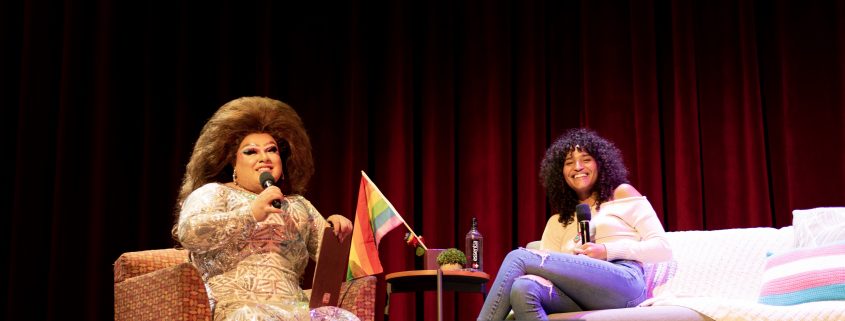‘Pose’ star Indya Moore discusses their entertainment career

Laughter and applause echoed through Bovard Auditorium as actor and model Indya Moore and drag queen and senior Angel Dust conversed and answered questions in front of students Thursday evening.
The event, attended by more than 100 students, was primarily organized by the Queer and Ally Student Assembly but received funding from multiple student organizations, including the Undergraduate Student Government Speakers Committee.
Moore, best known for their role as Angel on the award-winning FX television show “Pose,” began the event by discussing their career before acting when they faced significant difficulties when getting signed as a model, often working without pay and living on the street.
“After I was casted in ‘Pose’ and the premiere was released, a lot of things changed,” Moore said. “I was scouted by someone at [modeling agency] IMG.”
While discussing their difficulties as a trans and nonbinary person of color, Moore also stressed the privileges they have been allowed, such as appearing cisgender and being relatively lightskinned.
Since the premiere of “Pose,” Moore has been a vocal advocate for representation in the entertainment industry and for the liberation of marginalized people across the globe. They’ve been on the cover of multiple magazines and this year were included in TIME Magazine’s list of the 100 most influential worldwide.
“It means so much to me that they included me,” Moore said. “Mainstream media culture commands relevancy, so marginalized peoples’ absence from those spaces is further marginalizing and undervalues our membership to society.”
Moore also discussed the issues surrounding representation in entertainment, pointing to recent shows like “When They See Us,” a four-part miniseries about a group of Black boys, known as the Central Park Five, who were wrongfully convicted for the violent rape of a white woman in the 1980s.
“The actors are overwhelmingly celebrated for performing trauma for the entertainment culture,” Moore said. “But still very little to nothing is done about the issues that the stories around our marginalization are about.”
During a question and answer session at the end of the event, one student asked Moore what they do to cope with the trauma they experience while acting and how they stay sane.
“I don’t,” Moore responded. “It’s very hard, and I’ve underestimated how taxing performative art is greatly. You’re literally loaning your vessel to the spirit of a character that was created.”
QuASA co-director Steven Vargas, the event’s lead organizer, said he wanted to bring Moore to campus because they are a vocal advocate for trans people of color.
At a red carpet event last month, Moore wore earrings and held a frame depicting the faces of 17 black trans women who have been murdered in the United States this year. Moore often speaks about widespread injustice on their social media, as well.
“The things that they put on social media, I’ve noticed its been not only entertaining but educating on their life and what it is to be a nonbinary actor in Hollywood,” Vargas said. “They don’t just speak about the trans community, they also speak about the intersectionality of being a trans person of color.”
Pilar Lee, a freshman majoring in journalism, said she enjoyed how genuine and thoughtful Moore was in their responses throughout the evening.
“Their laugh brought me so much joy,” Lee said. “They’ve been through what seems like about everything in the world, but have still come to find this place of happiness.

